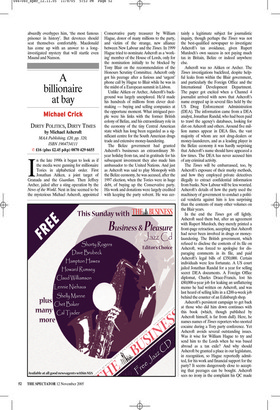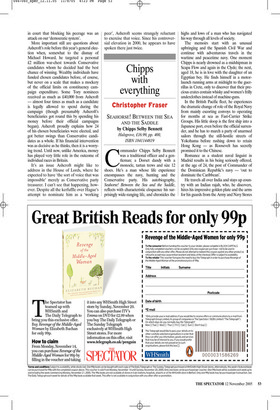A billionaire at bay
Michael Crick
DIRTY POLITICS, DIRTY TIMES by Michael Ashcroft MAA Publishing, £20, pp. 320, ISBN 1904734111 ✆ £16 (plus £2.45 p&p) 0870 429 6655 In the late 1990s it began to look as if the media were gunning for millionaire Tories in alphabetical order. First Jonathan Aitken, a joint target of Granada and the Guardian. Then Jeffrey Archer, jailed after a sting operation by the News of the World. Next in line seemed to be the mysterious Michael Ashcroft, appointed Conservative party treasurer by William Hague, donor of many millions to the party, and victim of the strange, new alliance between New Labour and the Times. In 1999 Hague tried to nominate Ashcroft as a ‘working’ member of the House of Lords, only for the nomination initially to be blocked by Tony Blair on the recommendation of the Honours Scrutiny Committee. Ashcroft only got his peerage after a furious and ‘urgent’ phone call by Hague to Blair while he was in the midst of a European summit in Lisbon.
Unlike Aitken or Archer, Ashcroft’s background was largely unexplored. He’d made his hundreds of millions from clever dealmaking — buying and selling companies at the opportune moment. What intrigued people were his links with the former British colony of Belize, and his extraordinary role in the economy of the tiny Central American state which has long been regarded as a significant centre for the South American drugs trade and extensive money-laundering.
The Belize government had granted Ashcroft’s businesses an extraordinary 30year holiday from tax, and in gratitude for his subsequent investment they also made him ambassador to the United Nations. And just as Ashcroft was said to play Monopoly with the Belize economy, he was accused, after the 1997 election, when the Tories were in huge debt, of buying up the Conservative party. His work and donations were largely credited with keeping the party solvent. He was cer tainly a legitimate subject for journalistic inquiry, though perhaps the Times was not the best-qualified newspaper to investigate Ashcroft’s tax avoidance, given Rupert Murdoch’s own success in not paying much tax in Britain, Belize or indeed anywhere else.
Ashcroft was no Aitken or Archer. The Times investigations backfired, despite helpful leaks from within the Blair government, and particularly the Foreign Office and the International Development Department. The paper got excited when a Channel 4 journalist arrived with news that Ashcroft’s name cropped up in several files held by the US Drug Enforcement Administration (DEA). The information came from a DEA analyst, Jonathan Randal, who had been paid to trawl the agency’s databases, looking for dirt on Ashcroft and others. Around five million names appear in DEA files, the vast majority of whom are not drug-dealers or money-launderers, and as a leading player in the Belize economy it was hardly surprising that Ashcroft’s name should have appeared a few times. The DEA has never accused him of any criminal activity.
The Times will be embarrassed, too, by Ashcroft’s exposure of their murky methods, and how they employed private detectives illegally to extract confidential information from banks. New Labour will be less worried. Ashcroft’s details of how the party used the machinery of government to conduct a political vendetta against him is less surprising than the contents of many other volumes on the Blair years.
In the end the Times got off lightly. Ashcroft sued them but, after an agreement with Rupert Murdoch, they merely printed a front-page retraction, accepting that Ashcroft had never been involved in drugs or moneylaundering. The British government, which refused to disclose the contents of its file on Ashcroft, was forced to apologise for disparaging comments in its file, and paid Ashcroft’s legal bills of £350,000. Certain individuals were less fortunate. A US court jailed Jonathan Randal for a year for selling secret DEA documents. A Foreign Office diplomat, Charles Drace-Francis, lost his £80,000-a-year job for leaking an unflattering memo he had written on Ashcroft, and was last heard of selling kilts in a £200-a-week job behind the counter of an Edinburgh shop.
Ashcroft’s persistent campaign to get back at those who did him down continues with this book (which, though published by Ashcroft himself, is far from dull). Here, he names names of Times reporters who snorted cocaine during a Tory party conference. Yet Ashcroft avoids several outstanding issues. Was it wise for William Hague to try and send him to the Lords when he was based abroad as a tax exile? And why should Ashcroft be granted a place in our legislature, in recognition, so Hague reportedly admitted, for his work and financial support for the party? It seems dangerously close to accepting that peerages can be bought. Ashcroft sees no irony in the complaint his QC made in court that blocking his peerage was an attack on our ‘democratic system’.
More important still are questions about Ashcroft’s role before this year’s general election when, somewhat to the dismay of Michael Howard, he targeted a personal £2 million war-chest towards Conservative candidates whom he decided had the best chance of winning. Wealthy individuals have funded chosen candidates before, of course, but never on a scale that makes a mockery of the official limits on constituency campaign expenditure. Some Tory nominees received as much as £40,000 from Ashcroft — almost four times as much as a candidate is legally allowed to spend during the campaign (though presumably Ashcroft’s beneficiaries got round this by spending his money before their official campaigns began). Ashcroft proudly explains how 24 of his chosen beneficiaries were elected, and got better swings than Conservative candidates as a whole. If his financial intervention was as decisive as he thinks, then it is a worrying trend. Until now, unlike America, money has played very little role in the outcome of individual races in Britain.
It’s an issue Ashcroft might like to address in the House of Lords, where he expected to have ‘the sort of voice that was impossible’ merely as Conservative party treasurer. I can’t see that happening, however. Despite all the kerfuffle over Hague’s attempt to nominate him as a ‘working peer’, Ashcroft seems strangely reluctant to exercise that voice. Since his controversial elevation in 2000, he appears to have spoken there just twice.




























































 Previous page
Previous page